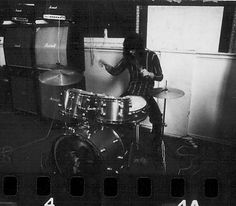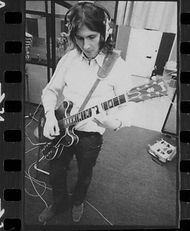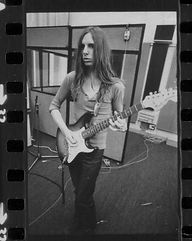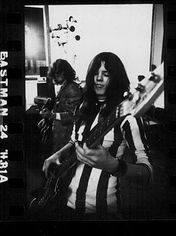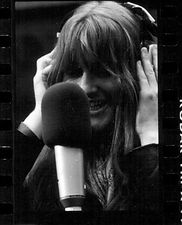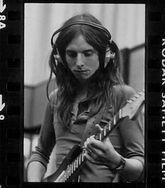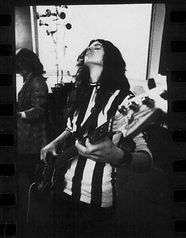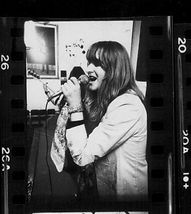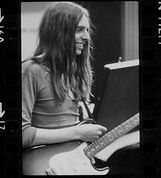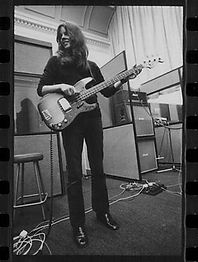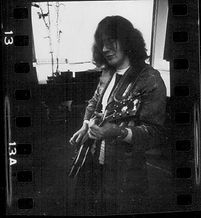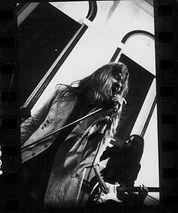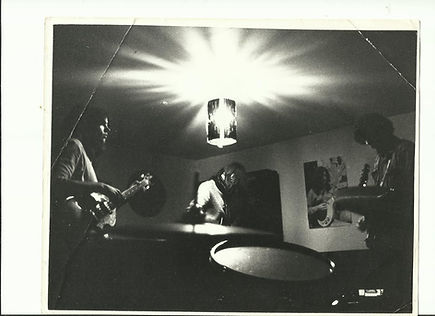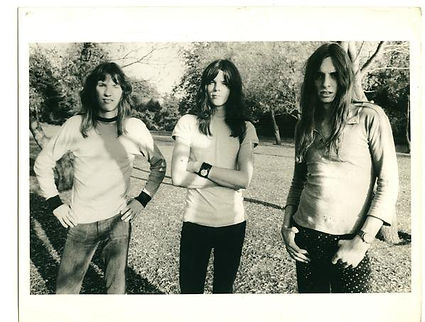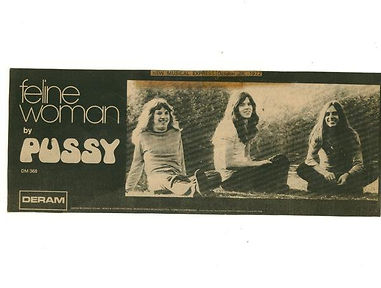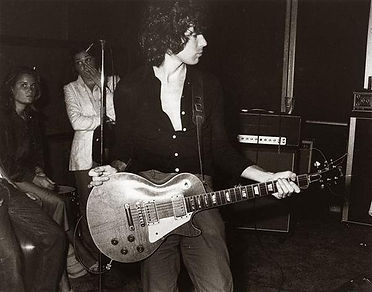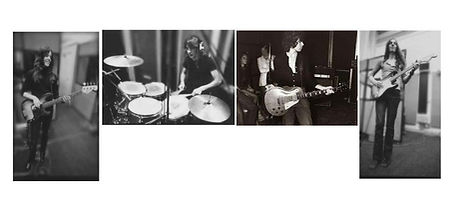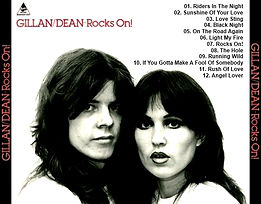About Jerusalem Band & Pussy Band
The first official Jerusalem band remastered reissue of the infamous metallic heavy rock album from 1972 produced by Deep Purple’s legendary frontman, Ian Gillan. The music is a menacing combination of over-the-top vocals and screaming lead guitars that could easily pass for something from the early 80s New Wave of British Heavy Metal scene, it’s that far ahead of it’s time. Originally released on the UK Deram/Decca label, and now a favorite among vinyl collectors, the album is now available on CD and Vinyl at Rockadrome Records from the original master tapes and also features pre-album demos, alternate mixes and a non-lp single track. The 20-page color booklet contains liner notes written by bassist Paul Dean, lyrics, press clippings and rare photos! A must-have for fans of 70s hard rock and also the early 80s NWOBHM sound.
Rockadrome Records (http://www.rockadromerecords.com/)
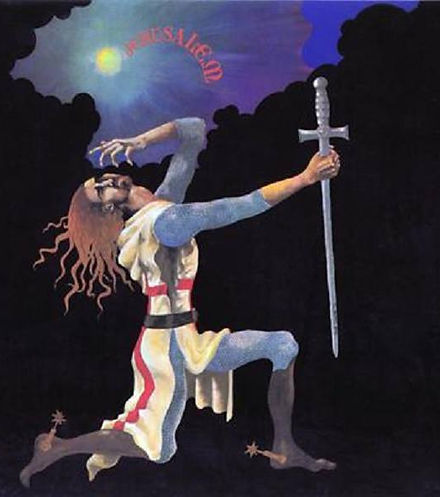
The Jerusalem band was an early 1970s British raunchy heavy rock five piece outfit. The band released one self-titled album worldwide in 1972 on Deram (UK catalogue number: SLD 6), produced by Ian Gillan of Deep Purple. Jerusalem’s only other release was a 45 rpm 7 inch single, the non-album ‘Kamikaze Moth’ backed with ‘Frustration’ from the LP.
The band's raunchy, unpolished and brutal rock was "way ahead of its time" and therefore the band never "made it" in a true commercial sense at the time. They were very much a "live" band and whilst many other rock bands were into getting their audiences to sit down and listen, Jerusalem were all about making their audiences stand up, move and join in. They gigged throughout Europe and shared the same stage as bands such as Black Sabbath, Deep Purple, Uriah Heep and Status Quo. They also played at some of the major Festivals in Europe to audiences of 50,000+ and usually went down a storm, because they were different, raw and uninhibited. It has often been stated within the music business that Jerusalem were a substantial influence on many of the 2nd generation Rock "metal" bands and Punk bands of the 80's.
Although Jerusalem signed with Deram, Nick Mobbs head of the EMI Harvest label also wanted them; he later became head of A&R for EMI and was the first person to sign the Sex Pistols. Founders of the band Paul Dean and Ray Sparrow eventually split the band and formed a 3 piece with Bob Cooke (who was replaced by Brian Goff) called Pussy. They released a single on Deram called 'Feline Woman' (there is an un-released album which will be released for the first time ever in late 2013 by Rockadrome Records), also produced and managed by Ian Gillan. In recent years Jerusalem's only album has been re-issued by Universal as a Japanese CD (2005) and has also become available through many Rock music websites. It would appear that Jerusalem is still continuing to grow as a cult band throughout the World.
In 2009 Paul negotiated a new Record deal with Rockadrome Records (USA). Having turned over the original masters to Rockadrome the album was remastered and has since been reissued successfully Worldwide over recent years up until the present on Vinyl and CD by Rockadrome Records (www.rockadrome.com). Including previously unreleased material.
Ian Gillan's thoughts about the band & working with the album:
"This is the first album by Jerusalem, a band which excites me very much; they are rough, raw and doomy with their own strong identity. As they are young and a bit green, they don't follow many rules, so their material is almost crude - but still immensely powerful in content.
I believe that, whenever possible, the work of writers and players in their formative stages should be recorded; before inhibition and self-consciousness set in, before fire and aggression die down, and while they are still absorbing influences and doing things which others might consider 'uncool'. Most important though, before they might develop that self-imposed rigidity which afflicts so many. I hope none of these things happen to Jerusalem, we'll have to wait and see, this album is just in case. I hope you like it as much as I do."
THE JERUSALEM STORY.
In the 5th form of St Probus School School, Salisbury, Wiltshire, UK, in 1966 there were 3 very good friends, Paul Dean, Ray Sparrow and Chris (Kef) Skelcher. A Canadian schoolfriend (Larry Taylor) one day brought in an album by a band called John Mayall and the Bluesbreakers who turned out to be an electric 12 bar blues band. This was something new for Paul, Ray and Chris and triggered something in all three. The music clubs at this time very much centred on the pure pop music of the time, but by chance within a few weeks of hearing the album they saw that John Mayall was playing at a popular local venue called the Alexander Rooms. They decided to go see. What they didn’t know at the time was that this was the beginnings of the Blues Boom in the UK, which was about to launch some amazing bands onto the scene and would eventually lead to the beginnings of Rock and all its subsequent off-shoots. For those who don’t know, John Mayall was responsible for much of what happened next in the music industry. The members of the Bluesbreakers over the years reads like a whose who of Rock Music.
Some of the leading bands of this boom in the UK were John Mayall & the Bluesbreakers, Peter Greens Fleetwood Mac, Savoy Brown Blues Band, Chicken Shack, Alexis Korner, Keef Hartley Band, Graham Bond. Many other bands were shortly to appear, who initially believe it or not ,also started as Blues Bands e.g. Ten Years After, Taste (Rory Gallager), Free, Jethro Tull etc. In the USA there were bands like Canned Heat and Paul Butterfield.
Paul, Ray and Chris went to see JM and were completely wiped away. None of the 3 had any musical background, but the next day at school they decided to form a band. This was the beginning of the Jerusalem Story.
There was no particular decision about who would play what, it just seemed to sort itself out. Ray was always a foot-tapper in school, so it seemed a good idea for him to be the drummer. He then found a very cheap second-hand Olympic kit. Chris new someone with a dirt cheap electric guitar, so took the position of guitarist and Paul found a home made bass advertised in the local paper. The neck wasn’t exactly flat, but it did toughen up his fingers very quickly! Paul also took the vocals ,as it appeared at the time that 4 strings would not be as difficult as six or the drums (even though at junior school he had been marked as tone deaf in music. Maybe he still is as far as some people are concerned!). They also bought a cheap 30 watt amp, a couple of speakers and a mic. The finances for all this came from odd jobs, like watercress and wild oat picking, harvesting, window cleaning, piano moving, literally anything was game. From day 1 they decided never to do cover versions, which considering their technical ability at the start, was a sensible decision. From then on every spare moment was spent learning to play, practising and listening to the blues. Not just contemporary, but all the old accoustic blues players from the USA.
Paul wrote the songs, which were all based around 12 bar blues and boogie. One of the first riffs he wrote was later to become ‘She Came Like A Bat From Hell’. Anyway, they plodded away for months until they had enough courage to play in public for the first time. This was just a small gathering of school friends and their German exchange students and was in a small hall at Salisbury College of Further Education. Much to their amazement it actually went quite well, as many of the students had never heard Blues before. They also discovered that doing your own material has a distinct advantage, as no-one knows how the songs go, so the only person that hears the mistakes is the one who makes them! In fact Paul couldn’t remember half the words and made them up as he went along or repeated previous lines, (next time you see your favourite band live, check it out, even the best have to do it sometimes!). They continued like this until the level of musicianship improved. Just the odd small gig, but mostly practice. During the holidays they continued to do all kinds of work to buy better gear. Eventually they bought 2 Kelly 100 watt amps and a cabinet each. Once they had finished their final exams, Paul went to Salisbury College of FE, Chris went to Bishop Wordsworth Grammar School (both to do A levels) and Ray went into the family grocery and post office business. They continued on their musical path, rehearsing everyday in the cellar of Rays parents business.
The Blues Boom was now evolving into the Rock Boom. Early pathfinders like Cream and Hendrix were being joined by new bands like Led Zeppelin, Black Sabbath, Deep Purple to name a few. Festivals were now a way of life like Woodstock, Isle of White 1 & 2, Bath Blues Festival which later became Shepton Mallet and eventually Reading Festival. Paul, Ray & Chris when not playing were out there enjoying the Rock revolution.
Paul and Ray were now beginning to take the whole thing seriously and Paul brought in a friend from College as second guitar. This was Bill Hinde. When Paul and Ray finally decided that they really wanted to go for it, Chris had decided that he was going to University in Cardiff and the band was no longer his main priority. Paul at this time had no idea what he wanted to eventually do after College and although also close to contracts to play football professionally (Plymouth, Bournemouth and Southampton), he decided to go with the music. Chris then left and was replaced by another College friend of Bill and Paul called Bob Cooke. They carried on like this for a while and then Paul decided he didn’t want to sing anymore and concentrate on writing and the bass. It was then decided to bring in a mutual friend called Phil Goddard to take over vocals. Thus the band became a 5 piece. Now things became more serious and real gigging started in earnest. Mainly small halls, pubs and clubs. Paul’s writing style had now changed and they were no longer a straight blues band. It was at this time that Paul wrote Primitive Man (still his favourite). Most of the songs were written by Paul, but Bob and Bill came up with the music for Beyond the Grave (Paul lyrics) most of Murders Lament and some of Frustration. One interesting fact is that Paul nearly always wrote with his bass guitar and then built from there. By this time the band was becoming well known within the locality and beyond as they were very different to the most successful bands from the area e.g. The Troggs and Dave Dee, Dozy Beaky, Mick and Titch (extremely successful pop bands with many hit singles). They were now moving up the ladder and bigger gigs and Colleges were now taken on. Paul originally came up with the name Jerusalem as it was the only piece of music ( William Blake/Sir Charles Hubert Hastings Parry) that he liked and thought had some passion about it during school assemblies. Later on Jerusalem used part of the piece as an intro for their live performances (Rock version of course).
Paul’s elder sister Zoë was based in London at this time, working for Record Companies and as a presenter on one of the first live chat shows about music, TV and Films ( A Whole Scene Going). It was around this time that Zoë first heard the band and was so shocked, that she decided to talk to some music people in London. A well known person in the business at the time, Micky Dallon, decided to put Jerusalem into Pye Studios for a couple of demos. Thus we have the very first recording of Primitive Man and Beyond The Grave. Although nothing happened immediately, things began to move fast. Zoë knew many of the top bands of that period and counted many as her friends. It was at this time that she ran into Ian Gillan again, now with Deep Purple, who had just exploded onto the scene with a No 1 single Black Night and the huge No. 1 album Deep Purple In Rock. Zoë had known Ian from his days with Episode Six. Deep Purple were in Southampton/Bournemouth in the middle of a tour and she invited Ian back to Salisbury to stay over at her mother’s house, before going back to London. This was Paul’s first meeting with Ian. When Ian walked into the house Paul was actually playing Black Sabbaths first album and Ian asked who it was because he liked it. Strange to think that a number of years later he would actually front the band for a short while!
Over the next few months there was some interest shown in the band by a number of people in the business, but nothing concrete. On a later visit by Ian to Salisbury ,Jerusalem were doing a gig at Salisbury College with Uriah Heep (their then bass player Paul Watts was a friend of Bobs from Andover). Ian decided to come and watch. He liked what he saw and decided to become involved with the band. Strangely enough, at the same time, Gerry Bron decided to take over Uriah Heep, so both bands journeys began at the same time. The next thing that happened was Ian brought Roger Glover down to Salisbury to record some demos. Roger had just bought a Revox 4 track machine and was beginning to experiment, so in actual fact this was probably the beginning of Roger's entry into production. He had also just bought a second-hand Mini which turned out to have a faulty battery, so there was much pushing of his car that weekend. At this time the band were rehearsing in a derelict farm cottage in the middle of farmland near Wilton. They called it Pig Mansion (later to be a song by Pussy) and Deep Purple also used the place once for rehearsing and writing before a British Tour. The farm was owned by a member of the Johnny Walker whisky family. It was a good experience for the band working with Roger and Ian. No-one knows what happened to the tapes, but it was the beginning of a more professional direction. John Coletta, one of Purples managers then began to show an interest in Jerusalem, but Ian decided he wanted to do it himself. Thus Ian and Zoë became the managers of Jerusalem. It was around this time that Phil decided the band was not his future, which meant finding a new singer. It was decided to advertise in the music press and hold auditions in London. There were about 40 replies. The audition was meant to be in a Church Hall, but once they found out it was a Rock Band they refused to let the band in. It was then decided to cross London to Belsize Park and use Bill’s brothers flat. They lost many of the applicants on the way and others just couldn’t be bothered to continue. They ended up with about 10 at the apartment. At the end of the day it came down to 2 singers, One had an exceptional voice the other was a natural showman. The showman got the nod, which was Lynden. Ian then decided to record a Jerusalem album before approaching Record companies. At this time Jerusalem already had a number of songs ready for recording – Primitive Man, I See The Light, She Came Like A Bat From Hell, Beyond The Grave, Murderers Lament, Frustration. Lynden was very much a lyricist rather than musician, so Paul and Lynden then sat down together at Paul’s mothers house and eventually came up with – Hooded Eagle, When The Wolf Sits and Midnight Steamer.
Ian and Zoë were now a couple and had bought a house in Pangbourne, Berkshire. Ian was also now the owner of Kingsway Recorders Studio in London (previously the legendary De Lane Lea Kingsway Studio where many greats had recorded including Hendrix and The Beatles) The Jerusalem album was to be recorded at Kingsway, so Jerusalem camped out at Ian’s house for the period. The engineer was Louie Austin.
The album only took a couple of weeks to record. It was hard work but some incredibly good times and a real learning experience for everyone involved. The atmosphere was really unique. The bands first proper recording session and Ian’s first introduction to Producing. It was at this time that Ian signed the band to the famous NEMS Agency for gigs. So Jerusalem started gigging all over the UK whilst Ian was talking to Record companies. At the end of the day it was between EMI’s Harvest label (their rock label) and Decca’s Deram label (their rock label). Head of A&R at Harvest was Nick Mobbs (later head of A&R at EMI and the first to sign the Sex Pistols) and at Deram it was Sam Hamilton. Both came up with similar deals, but Ian decided to go with Deram. The night that Sam decided he wanted to sign Jerusalem was the night they were playing at the famous Red Lion, Leytonstone with Status Quo. Status Quo who had been a singles chart band were now back to doing what they really wanted to do – Boogie. It was a great night all-round. Jerusalem had now acquired Deep Purples first P.A.system (J M Marshall 1000watt) and had 200watt (doctored) purple coloured J M Marshall stacks. They were regular visitors to Jim Marshalls shop in Ealing, London. Out of interest, these stacks eventually got stolen from Pig Mansion, so if you ever see any old purple coloured cabinets and 200 watt amps, have a look on the bottom, it may say Jerusalem!
Everyone seemed to agree that there was something different about Jerusalem in comparison to most other Rock bands at the time. No-one could actually put their finger on it, but as many have said since, they were probably 10 years ahead of their time. By the launch of the album Jerusalem were playing the top Universities, Colleges and famous spots like The Roundhouse Chalk Farm and Dagenham Roundhouse. Sometimes as support, sometimes as headline. They shared the same stage as many top bands of the time and also started doing the major Festivals in Europe. Because everything happened so quickly, many people didn’t know who Jerusalem were until they walked on stage. A good example was a major Festival in Vienna, where every other band on the bill was a name e.g. Deep Purple, Black Sabbath, Fleetwood Mac, Rod Stewart & the Faces, Fairport Convention, Curved Air, Rory Gallagher, Osibisa, Juicy Luicy etc. When Jerusalem came on stage about halfway through the bill, many people in the tens of thousands started walking out to get drinks, use the toilet, get food etc. Ian ‘Bige’ Hansford, Purples road manager was doing the mixing for Jerusalem, as they were using Purples gear. He said he had never seen anything like it before, one minute there were all these people walking out, then Jerusalem started playing there first song Frustration and all the people leaving turned around and stampeded back into the hall. This moment was actually captured by Austrian TV. After this Festival all the bands were to go to Frankfurt for another huge festival. Throughout the train journey, people kept coming up to the band to say they saw them on TV and wow etc. Suddenly from nobody’s they had become a known quantity. The Frankfurt festival was also memorable. Lynden was a real showman/crazy man on stage anyway, often instigated by Paul, but this night he surpassed himself, well it appeared so at the time even to the rest of the band. He suddenly started changing the words and doing some kind of strange dance and then collapsed on the floor. Turned out there was a fault with the mic and he was getting a major dose of pure electricity. That was the end of Jerusalem’s show that night, but most of the crowd obviously thought it was part of the show and really thought it was a great ending. The Promoter of the Festival was so pleased with Jerusalem (he had taken a chance putting them on the bill) that he gave them a bonus (unheard of for a Promoter!!) and paid for them to fly back to the UK on a proper flight with Deep Purple.
The relationship between the members of Jerusalem was always good and thus they enjoyed everything about being a band to the fullest degree. They were having such a crazy time in the bandwagon (OGY) once, that they were nearly late for a gig at Liverpool University, because they managed to drive 20 miles past Liverpool without noticing (one of the biggest cities in the UK!)
Paul and Ray had been great friends since school, had a lot in common and did most things together. Paul took the role of leader of the band throughout its existence with the full support of Ray. It was Paul who always took the final decision on anything regarding the band. Paul and Ray as the creators were the foundation and the driving force. Bill and Bob built on top of this and Lynden was Lynden!
Deram wanted a single for quick release, but not an album song. Paul and Lynden sat down at Paul’s mothers house and came up with Kamikaze Moth in about an hour. The band had a quick practice of the song and then went to London the next day and recorded it in the Decca Studio.
Jerusalem was a unique band at the time. No-one ever knew what to expect and sometimes the band as well. They were young, raw, energetic, followed no rules, accepted no compromise and were not overburdened by influences. It was one of those strange moments in time when a small group of people came up with something that cannot be truly defined or ever be re-created. There was no middle road with Jerusalem, when people left their gig they either loved it or hated it. Whether you like them or not, for some reason Jerusalem has become a legend that will not lie down and die. After 43 years they have a bigger fan base now than they did at the beginning and it’s still growing!
Why did Paul and Ray disband Jerusalem after such a short time? The answer is probably found in Ian’s quote on the album as to why he wanted them recorded. To Paul and Ray, Jerusalem was about rock in its purest and most basic state. Lynden and Bill were evolving and wanted to move in a more polished and progressive direction. Bob at that time just enjoyed playing. The Rock scene was exploding in so many directions within a very short period, from the Zeppelin, Purple, Sabbath to Pink Floyd, Genesis, Yes, etc. These bands themselves changed overtime and experimented in different directions, some of them returning to their roots many years later. Studio production was advancing in leaps and bounds. Paul and Ray felt that they had made their statement and didn’t want Jerusalem forced into areas created by peer pressure and the accountants and lawyers who were beginning to takeover and run the music business based purely on commercial terms. Luckily, up to this point in time, most of the Record/Music Industry, etc. was run by ex-musicians and people with some understanding of music and the vision necessary to take gambles. Without these pathfinders many of the most successful bands of the 60’s and 70’s would never have been given a chance. After discussions with Ian and Sam everyone agreed that it was a good time to end as to carry on would lead to compromise and changes which Paul and Ray decided would dilute and alter what Jerusalem was all about. They could have changed the line-up and continued as Jerusalem, but what Jerusalem had created was too important to both of them to merely use as a ladder for their next evolution They decided to create something different, which was to become the Pussy band . Initially Bob was the guitarist, but was later replaced by Brian Goff a young American whose mentor was Ritchie Blackmore. The never released Pussy album was released by Rockadrome on CD with many extras in 2013. A vinyl is to follow soon.
THE PUSSY STORY
The original early 70's rock band Pussy from Salisbury , UK , was managed and produced by Ian Gillan of Deep Purple. Paul Dean and Ray Sparrow formed Pussy along with Bob Cooke (later replaced by Brian Goff) after disbanding cult rock band Jerusalem . They made the decision not to continue with the name Jerusalem out of respect for what Jerusalem was all about at that time in musical history, after all Jerusalem was a one-off moment in time creation and could never be recreated. Although the musical direction of Pussy was very different to Jerusalem , which is surprising as Paul was the main writer for both bands, they continued to keep that raw, no rules edge which set them apart from many of the bands of the period. At this time it was very fashionable to write very long songs and use the full repertoire of the latest studio equipment, but Pussy did the opposite, so all recordings were around single length and recorded virtually live in the studio. Very much a 'wham bam thank you mam' type impact. Their songs could be about absolutely anything whatsoever - 'Feline Woman' - Sex, 'Riding Down The Red Flag' - Politics, 'IFO' - Extraterrestrials, 'The Knife' - Passion, 'Lady Ella' - Ella Fitzgerald, 'Moonshine' - Booze etc, maybe they were also taking the piss out of everyone else at the time, who knows? Ian was far more proactive with Pussy and was actually responsible for singing a considerable amount of the backing vocals on the songs (also played piano on Feline Woman version 2 and co-wrote 'Place in the Sky')). Pussy really were a good-time band with no pretensions of being super musicians or technical geniuses. If it seemed like fun it was worth a try, which explains a lot about their sound and direction. On stage anything could happen, no rules of course! They gigged all over the UK and Germany as a main and support act, very much in the same way as Jerusalem had done. At one time they supported Roy Wood's (founder of the Electric Light Orchestra E.L.O.) new band Wizard and Roy decided he wanted them as his support band for Wizards first World Tour, but unfortunately Roy became involved in a legal wrangle with his old record company and was forced to stop everything he was doing musically for a period of time.
After the disbanding of Jerusalem - (the rumours over the years said there was a second unreleased Jerusalem album - this is not true - it was actually the Pussy album) - Decca (Deram Label) decided to continue the Jerusalem contract for Pussy. The first and only Pussy release on Deram was a single entitled 'Feline Woman' which although well received did not make any major waves because the BBC refused to play it for some reason (unofficially banned - SEX!), but leading BBC DJ at the time Alan Freeman took no notice and played it against orders on his UK's No1 radio show, said he really liked it and should have been a hit. One has to remember that in those days the BBC had a monopoly, so they really decided what became successful. The only real minor competition was Radio Luxembourg whose Rock DJ Kid Jenson did play it.
Pussy at this time were constantly in Ian's studio Kingsway Recorders, Olympic, CBS and De Lane Lea putting down new tracks for future singles and an album, but then Sam Hamilton A&R left Deram to go to Australia and as always happens in record companies, if you loose the guy who signed you then the company looses interest. Ian decided to end the contract and look elsewhere, but although there was considerable interest no one was willing to go with Pussy as the whole music industry was now in shock and disarray because of the sudden explosion of Punk music, so Pussy went on ice for a while. Paul did some solo projects and worked with Ian on other non-music related projects and Ray & Bob continued with a new band for a short while. A couple of years later when the Ian Gillan Band were playing in France, Paul and Ian thought maybe it was worth seeing if anyone there was interested in the Pussy album as mainland Europe was going in a different musical direction to the UK. To their surprise, a couple of majors showed an interest and eventually Ariola said yes and could the band reform. Ray and Paul were still very good friends and they then approached Bob to see if he was interested. After some discussion Bob declined for a number of reasons, so it was necessary to find another guitarist.. Ian knew a young American guitarist called Brian Goff (Paul had met him before) who was a good friend of Ritchie Blackmore (Ritchie was Brian's guitar mentor) and he was also the son of Ivan Goff producer/screenwriter (TVs Charlies Angels, Mannix etc. and Logan 's Run). Paul, Ray and Brian hit it off straight away. To make sure there was some continuity of sound Brian re-did the guitar on most of the existing Pussy tracks and Paul wrote a handful of new tracks on which Brian did all the guitar work. Thus the first Pussy album was completed - but not released. Once again fate decided the time wasn't right. The World had entered a major recession and everyone was in financial trouble which resulted in Pussy once again going on the backburner, this time for 30+ years!
Ray continued playing with a number of bands in the Salisbury area, Brian joined the Los Angeles band the 'Sights' and Paul moved on to the business side except for doing the Gillan/Dean album "Rocks On' which was released in 1984 (Thunderbolt). This he did with Pauline Gillan, Ian's sister and 20+ different musicians.
Now for the first time ever the missing Pussy album + other extra Pussy tracks have been released courtesy of Rockadrome Records and Paul Dean.











